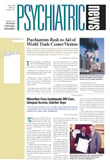The psychological impact of the terrorist attacks on World Trade Center and the Pentagon is expected to be felt for months, even years.
Health and Human Services Secretary Tommy Thompson responded to concerns expressed by state and local officials in New York, Washington, D.C., and Pennsylvania last month by sending each a portion of $28 million earmarked for mental health services. The funds are part of a $126 million disaster-relief package primarily for New York City, which has suffered the most casualties and subsequently experienced the highest health care costs in responding to the World Trade Center attacks last month, according to HHS.
John Oldham, M.D., chief medical officer for the New York State Office of Mental Health (OMH), told Psychiatric News that days after the attacks the state had received $1 million from HHS and distributed it to New York City to support emergency mental health services.
Of the $28 million designated for mental health services in affected states, $6.8 million will be used for crisis mental health services beyond the initial counseling services supported by the Federal Emergency Management Agency (FEMA) and to assess long-term needs. The remaining $21.2 million will be used to bolster the existing mental health and substance abuse system.
FEMA funds the Crisis Counseling Assistance and Training Program administered by the Center for Mental Health Services Emergency Services and Disaster Relief Branch. CMHS in conjunction with other agencies helps states and communities meet the mental health needs of disaster survivors and rescue workers, according to CMHS.
U.S. Surgeon General David Satcher, M.D., told Psychiatric News that because rescue workers face unique psychological challenges, 43 members of the Commissioned Corps Readiness Force (CCRF), created by the surgeon general in 1994, were deployed last month to monitor and meet workers’ medical and mental health needs at ground zero in New York City, the area surrounding the World Trade Center. The CCRF medical team includes psychiatrists, psychologists, psychiatric nurses, and psychiatric social workers, said Satcher.
The CCRF is a group of U.S. Public Health Service officers who can be mobilized in times of disaster or public health emergencies.
“Some mental health specialists have also been deployed to the USNS Comfort, a ship being used for recreation and recovery for the rescue workers,” said Satcher.
The goal is to provide 24-hour physical and mental health care for rescue workers, including those who work in search and rescue, law enforcement, and emergency medical services, and construction workers.
“We learned from experience with the Oklahoma City bombing that relief workers are at risk for depression, suicidal ideation, and divorce,” said Satcher.
He added that 250 CCRF psychiatrists, psychologists, psychiatric nurses, and social workers have offered their assistance, if needed.
New York City has been inundated with volunteers who are health and mental health professionals (
see page 1), Satcher noted. However, he expects the need for mental health services to continue as posttraumatic stress disorder and other psychiatric problems surface.
Satcher noted that Robert DeMartino, M.D., a child and adolescent psychiatrist with the CMHS Program in Trauma and Terrorism, and Brian Flynn, Ed.D., assistant surgeon general and director of the CMHS Division of Program Development, Special Populations and Projects, were among the federal mental health and crisis-response experts sent to New York City last month to support the state and city governments provide mental health services and assist in long-term planning efforts.
Information on HHS health and mental health disaster relief efforts is available on the HHS Web site at www.hhs.gov/news/press/2001pres/20010920a.html. ▪
